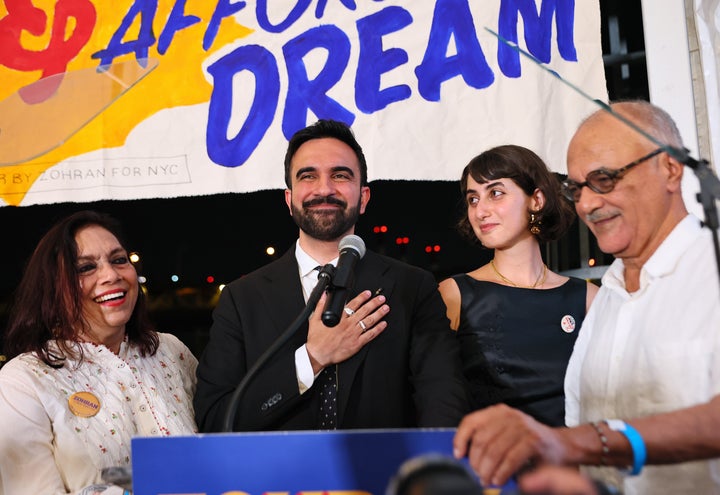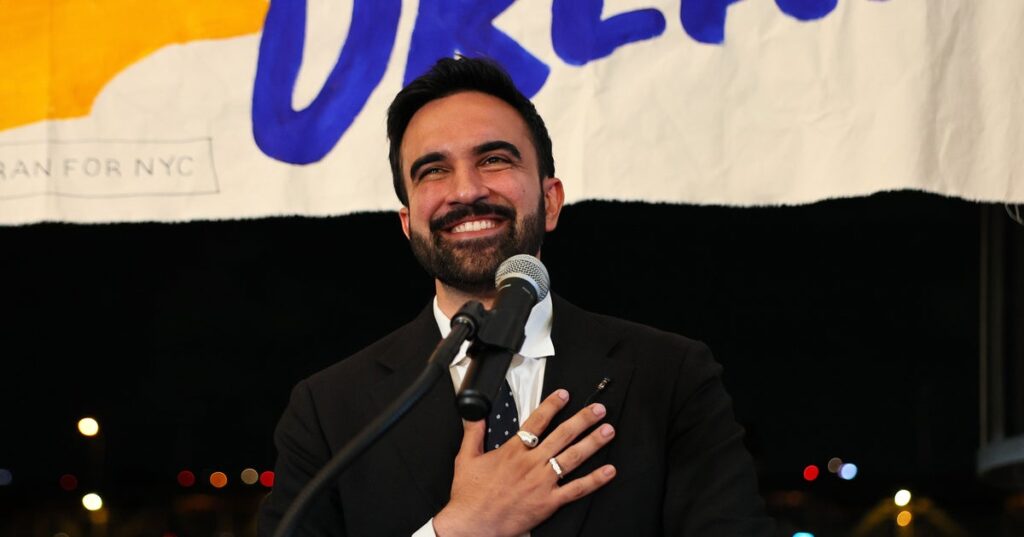New York Assembly Member Zohran Mamdani’s stunning political upset in the New York City mayoral primary early this week elicited a lot of questions on social media.
Some examples: Is the 33-year-old a Communist for wanting universal childcare and making city buses fare-free? (President Trump says “100%”!) How was he able to out-organize the donor and establishment classes that backed the more centrist (though scandal-ridden) Andrew Cuomo? And why so handsome? (We kid you not.)
For some, though, the most pressing and vexing thing about Mamdani the candidate was his bank account: Why, they wondered, would someone who comes from money care so much about what happens to people with less? That seems suspicious, they thought.
Mamdani is the son of Mira Nair, an Academy Award-nominated director, and Mahmood Mamdani, a professor at Columbia University. Some presumed riches from that pedigree. For those critics, it seemed somewhat ironic that a man from such wealth would make addressing rising inequality in the city a centerpiece of his campaign.
“A new credibility problem for Democrat communist socialist Zohran Mamdani,” wrote Fox Business’ Elizabeth MacDonald on Wednesday on X, upon hearing the news. “Despite campaigning with a working-class identity, Zohran comes from a very rich, affluent and well-connected family. His parents’ net worth is estimated anywhere from $2M-$10M — which could lead to critics saying this is why it’s easy for him to campaign on ‘free everything’ when everything is paid for you.”
“It is unfathomable to some people that a person can have a good life and go, ‘damn it’d be cool if other people also had good lives we should make that happen.’”
– Bill DiFilippo, a sports journalist
Vickie Paladino, a Republican councilwoman from Queens and vocal Mamdani critic, called him “Trust fund Zohran” on X, claiming that “he got married in a multimillion dollar affair in Dubai, at a luxury resort … A very far cry from his pathetic subway photo ops. He’s a total fraud.”
Meanwhile, Forbes published a whole story delving into his finances. The story was heavily ratioed on Bluesky, with a lot of similar commentary: “It is unfathomable to some people that a person can have a good life and go, ‘damn it’d be cool if other people also had good lives we should make that happen,’” wrote sports journalist Bill DiFilippo.
It’s not just the right who finds Mamdani’s win off-putting, though. Many national Democrats, who funneled the lion’s share of $25 million into a pro-Cuomo PAC, are flummoxed by Mamdani’s ideas about wealth redistribution. On the campaign trail, he promised to hike taxes on the wealthiest New Yorkers and freeze rent increases for people living in rent-stabilized apartments. He also proposed creating a chain of city-owned grocery stores.
On X, Lawrence Summers, a former treasury secretary under President Bill Clinton and a Harvard University president emeritus, voiced the concerns of many centrists.
“I am profoundly alarmed about the future of the [Democratic National Committee] and the country, by yesterday’s NYC anointment of a candidate who failed to disavow a ‘globalize the intifada’ slogan and advocated Trotskyite economic policies,” the economist wrote.
For Some, Mamdani’s Economic Ideas Stink Of Class ‘Betrayal’
Why is the reaction to Mamdani and his political motives so heated? Michael W. Kraus, a professor of psychology who studies economic inequality at Northwestern University, thinks that for some people, Mamdani’s policies stink of class betrayal.
“The idea that someone rich or privileged would use their social capital to make others’ lives better can cause an intense reaction,” he said. “You can see the intensity of this reaction in other contexts in history, such as the violence perpetrated against white civil rights workers.”
Arguing against your own economic interests sets expectations for how other wealthy people should behave differently, Krause said — expectations that your wealthy peers may not take kindly to.
What’s interesting, though, is that while Mamdani may come from family money, his personal wealth is nothing too out of the ordinary. In the aforementioned article, Forbes estimated that the 33-year-old renter is worth around $200,000, 50 times less than Cuomo, who the magazine pegged at around $10 million.
ANGELA WEISS via Getty Images
Hersh Shefrin, a professor of behavioral finance at Santa Clara University in California, isn’t surprised Mamdani leans left because of his parents’ background.
“Neither of his parents are tycoons,” he told HuffPost.
Mamdani’s mother makes indie films (granted, critically lauded ones). His father is an academic at Columbia University, with a joint appointment in the departments of anthropology and political science, where he specializes in fields like colonialism, civil war and genocide in Africa and human rights.
“These areas of specialization are dominated by academics on the left,” Shefrin said. “For this reason, is it any surprise that Zohran would choose to be on the left portion of the political spectrum?”
Mamdani’s family is nowhere near hedge fund billionaires, but in America, “we tend to flatten the nuance around class,” said Dominique J. Baker, associate professor of education and public policy at the University of Delaware. If a person has even some money, we portray them as privileged and wealthy.
It’s not surprising at all that conservative media flattened the nuance around Zohran’s perceived wealth, Kraus said.
“It is an example of a common political strategy in conservative media, where a candidate’s identity and authenticity is questioned as a tactic to peel off support,” he told HuffPost.
The logic is, “How can Mamdani really be a socialist if he didn’t suffer economic insecurity?” the professor said.
“Remember the questions about Kamala Harris’ racial identity during her campaign?” he added. “The argument casts doubt on the sincerity of his policy ideas and true commitment.”
Is America Just Too Unfamiliar With Noblesse Oblige?
Zohran’s win also brings into focus our cultural conception of “noblesse oblige,” a French term that literally translates to “nobility obligates.” The idea is that with great wealth comes great responsibility to give back to the community and those in need.
Is noblesse oblige just too foreign a concept to Americans? Baker isn’t so sure about that.
“It does appear to be foreign to the current crop of uber wealthy people,” she said. “But in the past, we got the New York Public Library and Vanderbilt University through wealthy men’s largess.”
Of course, there’s a big difference between noblesse oblige and redistribution of wealth, which Zohran’s policies reflect. “Offering to donate your money to build a library is very different from paying your fair share of taxes,” Baker said.

Michael M. Santiago via Getty Images
Zohran’s support of social programs aimed at leveling the playing field aligns with a more general popular belief about the wealthy: The idea that after accumulating a certain amount of wealth, people become more liberal and feel compelled to give. Think of the social largesse of Warren Buffett and Bill Gates, the latter of whom has said his children will inherit less than 1% of his wealth. (Still around $10 million each, so don’t feel too bad.)
Both Kraus and Baker said cases like that are actually kind of rare.
“There’s a great study that highlights the ways that super wealthy Americans ― the top 1% ― actually are much more conservative than the average American when it comes to economic policy like taxes and social welfare spending,” Baker said.
In his 2023 book “Poverty, by America,” sociology professor Matthew Desmond makes the point that tax fraud happens more among the wealthy.
There’s also some evidence that the wealthy, the top 5%, are more willing to accept inequalities in our society, and this predicts less willingness to support economic redistribution policies, Baker said.
Mamdani is not a member of the top 1%, she noted ― the threshold for that in the U.S. in was almost $800,000 and nearly $1 million for New York state (for income not wealth) ― nor is he a member of the top 5%, for which the cutoff is nearly $300,000 for the U.S. (again, we’re talking income not wealth).
So, if you do consider Zohran to be wealthy, Baker thinks it is arguably impressive that he wants to give back, relatively speaking.
Baker added, “I think it’s a pretty great thing when someone who might have been able to struggle less says, ‘I want to help make sure other people don’t have to struggle, too.’”
Read the full article here


